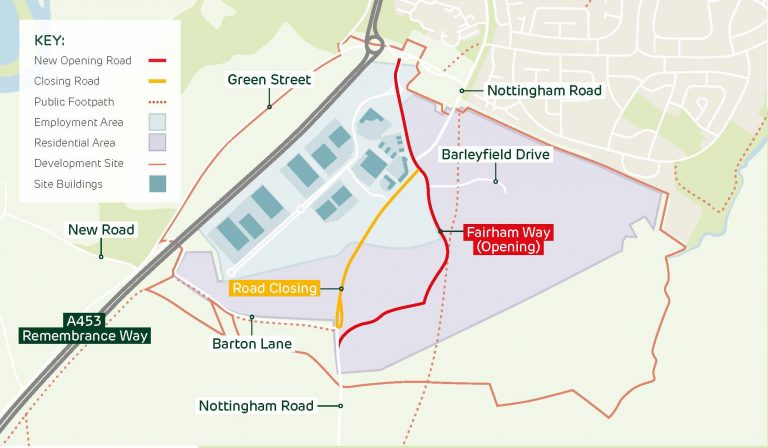Phenna Group makes trio of acquisitions
£42m Leicester Square boutique hotel for sale amid growing investor demand
A newly converted boutique hotel in Leicester Square has been listed for £42 million, reflecting increased investor appetite for London’s luxury hospitality sector. The 2-5 Charing Cross Road property is set to open by June.
London’s high-end hotel market is expanding, with 757 new luxury rooms expected by the end of 2025—the largest annual increase since 2014. Despite rising costs, demand remains strong, with occupancy rates returning to pre-pandemic levels.
However, profitability faces pressure from rising wages and operational expenses. RSM UK warns of cost challenges ahead, but increased consumer spending could help sustain growth.
Global real estate firms Avison Young UK and JLL also market the freehold contract for 3-5 Charing Cross Road.
Three Bunkers £100k golf challenge kicks off with focus on those to benefit from support
New partner appointed at Nottingham accountancy firm
Property consultancy makes 34 East Midlands promotions
Work starts on more than 760 new Nottinghamshire homes
TowerBrook makes majority investment in Corby sustainable waste management solutions business, Axil
TowerBrook, a purpose-driven investment firm, has made a majority investment in Corby-based Axil, the sustainable waste management solutions business.
With TowerBrook’s backing, Axil is poised for growth, strengthening its market presence and expanding its service offering.
TowerBrook, has invested in Axil through its Impact strategy, TowerBrook Delta which supports high-potential companies with impact at their core. This investment aligns with Axil’s vision of delivering sustainable waste management solutions that create positive impact.
Edward Pigg, Managing Director at Axil, said: “We’re excited to welcome Towerbrook as our partner as we share the same enthusiasm and energy to improve the environmental performance of our customers.
“Our teams share many common values, and we look forward to continuing our track record of growth with their support. What impressed the Axil team during the shareholder transition was the level of engagement and interest demonstrated by Towerbrook with our staff at all levels.”
Tom Redpath, Head of Europe at TowerBrook Delta, added: “We are delighted to partner with Axil. Axil is a great example of the deep thematic work we do in TowerBrook Delta to find high growth, high potential, high impact businesses with great teams underpinned by enduring economic and behavioural demand.
“Axil sits within Resource Sustainability, one of our six key global investment pillars. As global resource scarcity rises, raw material costs increase, and supply chains grow more complex, this area is more critical than ever. In Europe, stricter regulations, higher disposal costs, and limited access to raw materials are driving a stronger push for resource sovereignty.
“Axil’s innovative resource management solutions help businesses reduce waste at source, improve recycling rates, and lower operational costs. Exceptional ROI and NPS have fuelled strong growth, creating a solid platform for the future.
“From the outset, there was real energy and chemistry with Ed and the Axil team. They embody what we seek in a partner – high-performing, high-potential, high-integrity, with low ego and a relentless drive for growth and improvement.
“We are delighted to support their growth aspirations, while maintaining their award-winning culture.”
The sellers were advised by Opus Corporate Finance.
South Wales fire safety equipment supplier snaps up Chesterfield firm
East Midlands financial and related professional services exports register strong year-on-year increase
- Strengthen collaboration between the Office for Investment, UK government bodies, and devolved policymakers, especially in new mayoral combined authorities.
- Align government goals at all levels, linking trade promotion with the Industrial Strategy and Local Growth Plans to maximise regional specializations.
- Improve information sharing between devolved bodies and UK government officials to identify opportunities and better coordination of response.
- Pilot a national brokerage scheme to connect capital with investable projects and enhance the identification, structuring, and presentation of opportunities.
- Swiftly agree an ambitious UK-Switzerland FTA which will provide UK businesses more freedom to operate in Switzerland, secures digital trade, enables access to high-skilled UK and Swiss talent and commits to collaborating on the green transition.
- Conclude a UK-India FTA that liberalises trade in services by easing restrictions on UK businesses operating in India, securing digital trade, fostering regulatory co-operation, providing investment protection, and supporting more short-term movement of business personnel.
- Use the FTA negotiations with Gulf Cooperation Council members to embed regulatory cooperation that promotes frictionless trade and investment as well as enhancing stability and growth in the global economy.
- Put bilateral financial regulatory dialogues with markets such as the US, EU, Singapore, and Japan on a more robust footing by improving transparency, industry engagement and by adopting a more outcomes focussed approach to promote stability and growth in the global economy.
- Use the models developed under the UK-Switzerland Mutual Recognition Agreement (MRA) to secure more UK trade with other leading financial centres, such as Japan and Singapore.
- Work to boost UK and international investment (such as pensions investment) in high-growth companies and develop the UK’s ecosystem for scale-up investment. This will help to keep fast-growing businesses in the UK and grow our share of the global industry.
- Make the UK a global hub for data and technology by using trade and investment policy to lead in global technology and innovation.
- Position the UK as the world’s leading gateway to international investment opportunities.
- Target development work at markets where the industry can deliver the greatest value and capture new market opportunities.
Northamptonshire food group gobbles up edible oils and fats platform
William Davis Homes makes three key appointments to land team
Sainsbury’s opposes Aldi plan in Matlock as council recommends approval
Despite opposition from Sainsbury’s, Derbyshire Dales District Council has recommended approval for an Aldi supermarket in Matlock’s former Harveydale Quarry. The proposed 1,864-square-metre store would create 50 jobs and redevelop a derelict site.
Sainsbury argues that the town does not need another supermarket and claims that the development would harm the trade of its existing stores. It also cites concerns over pedestrian access and the impact on independent retailers. However, 757 letters of support were received, with the only formal objection coming from Sainsbury’s.
Council planners state the Aldi store would not significantly impact the town centre’s economic viability. The project includes 109 parking spaces and upgraded traffic controls on Dale Road. It will replace former Derbyshire County Council offices and a local MOT garage, despite concerns over the loss of the mechanic business.
A final decision will be made on April 8.
Leicestershire caravan park secures £25,000 for expansion
The Grange, an independent camping and caravan park in Leicestershire, has secured £25,000 in funding from First Enterprise through the British Business Bank’s Start Up Loans programme. The investment will support expansion into surrounding land and introducing a new glamping experience, including Leicestershire’s first yurt accommodation.
The site offers 26 fully serviced pitches, bespoke facilities, and an on-site shop featuring local produce. The funding will enable the addition of six new hard-standing pitches, set to open in May 2025. The Grange, which recently won Best Camping, Glamping & Holiday Park at the Leicestershire Tourism & Hospitality Awards, aims to enhance its offering to meet growing demand for premium outdoor stays.
Derby’s new taxi licensing rules could disrupt local business
Derby City Council’s proposed changes to taxi licensing could severely impact private hire taxi owners, with the GMB Union warning that hundreds of drivers may lose their livelihoods.
The council’s plan aims to reduce the maximum age for licensable vehicles from 15 to just 5 years, potentially forcing many drivers to use older vehicles out of business. This move would set Derby apart from neighbouring cities like Nottingham, which allows taxis up to 10 years old.
GMB Regional Organiser Craig Thomson voiced concerns that the council’s approach, focused on reaching green city targets, unfairly burdens local taxi drivers without sufficient consultation. He called for the council to work with drivers and unions to develop a more balanced plan. This shift in policy could disrupt the daily operations of a vital service for the local community, putting many businesses at risk.
Conversion of farm buildings into holiday lets approved in Northamptonshire
Local authorities have approved plans to convert a set of rural farm buildings in Northamptonshire into a holiday accommodation site. The site, situated near Blatherwycke, northeast of Corby, will transform five mid-19th-century barns and stables into six holiday homes. The development also includes plans for a café and retail space.
The proposed holiday homes will vary in size from one to three bedrooms and will feature fully equipped living spaces, kitchens, bathrooms, and terraces. A café offering food and drinks and a bicycle rental service in one of the larger units will be included.
The applicant, F & A George Ltd noted the local demand for tourist accommodation, citing nearby attractions such as Fineshade Woods and Rutland Water, as well as the market towns of Stamford and Oundle.
The site will retain existing access from Blatherwycke Road, with a new car park to be constructed to accommodate guests.
Work gets underway to find new members for Leicester and Leicestershire’s Innovation Board
Fairham Way to become main arterial route through Nottingham’s new neighbourhood
BWB sets out plans to double in size as built environment industry confronts new challenges
Long Sutton dental practice sold to expanding group
Labour’s £600m investment to strengthen construction workforce in the East Midlands
The UK government has committed £600 million to address the growing shortage of skilled construction workers, focusing on increasing workforce numbers nationwide by 2029.
This initiative forms part of Labour’s Plan for Change, which aims to boost the industry by training 60,000 workers and expanding access to construction jobs for young people. Key elements of the plan include creating new training opportunities, expanding apprenticeship programmes, and introducing technical colleges focused on construction skills.
For businesses in the East Midlands, this investment is a significant step toward addressing the long-standing labour gaps in the construction sector. The region, already home to 130,000 construction workers, stands to benefit from these measures, which are expected to provide a sustainable talent pipeline for major housing and infrastructure projects.
These moves come after a significant contraction in the workforce, with approximately 320,000 construction roles lost nationally between 2019 and 2024. The new funding is seen as crucial in revitalising the sector, ensuring that it can meet the UK’s housing and infrastructure demands moving forward.





















